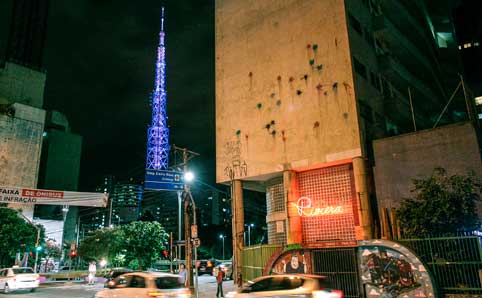
In contrast to the unthinking pride and tribalism of dwellers of some of the world’s other major cities, there’s a tendency in São Paulo for its inhabitants to err on the critical side, far from focusing on their city’s better points.
Paulistanos are often ruefully aware of the city's shortcomings – bumper-to-bumper traffic and summer flooding, for instance; a lack of urban planning, and a social divide that causes seismic ripples of related problems. And yet it’s their home and they love it – with a thoughtful, tender, exasperated kind of love.
But pushing the city’s self image in interesting new directions, a clutch of street-based movements and pressure groups, inventive galleries and bars, and sparky little independent cultural centres have been sprouting in São Paulo in recent years. Both making change and hinting at changes to come, they’re places like the well-established Matilha Cultural centre, and Espaço Walden on Praça da República.
Like Trackers audio-video school and party hotspot, and the art gallery Estúdio Lâmina, both close to Vale de Anhangabaú. What they all have in common, aside from sharing an energetic, DIY outlook and a sense that the city could change, is their location in SP’s run-down Centro – the focal point of some of the most exciting aspects of this new wave of urban culture.
Winds of change
New; but not unprecedented. Deep in Luz, one of Centro’s most historic neighbourhoods, pioneers like theatre company Cia. Pessoal do Faroeste were already blazing a trail there in 1999. We spoke to its director, Paulo Faria (read our interview here), on theatre and the evolution of the area, which suffers from some of the city’s worst levels of inner-city deprivation – and of his hopes for what might come next in Luz.
There’s something in the air and in the zeitgeist – a sense that the city needs to change its ways in terms of urban planning and more urgently, in its urban usage – and it’s bubbling up all over. A major article in the New York Times’s T magazine (nytimes.com/t-magazine) in March 2013 featured an insightful piece on some of the changes taking place in the city.
New uses for much-loved old buildings are bucking that SP craze for tearing down the old to replace it with new – an approach that has led to some of the worst aspects of the city’s blocky, grey-and-white cityscape. In the heart of downtown, there’s Pivô, a new art space inside the Copan building.
And facing onto the Vale de Anhangabaú, bar Balsa, set to open in June/July 2013, has a huge terrace with the benefit of one of the city’s finest views: of the elegant Martinelli building, and the Empire State Building-esque ‘Banespão’.
Balsa itself is located on the top floor and roof of an otherwise unremarkable old building that houses a slowly winding-down CD-distribution business; and there are hopes amongst some of those who’ve attended the nascent bar’s occasional private gatherings, that there might be space there, eventually, for galleries and other cultural hotspots – part of a number of interesting initiatives currently being discussed around the Anhangabaú area, which have kicked off with the new Praça das Artes centre for music and dance.
Like Balsa, also still in embryonic form is the resurrected version of the old-time bar Riviera, under development in a fine Modernist bulding on the iconic corner of Avenida Paulista and Rua da Consolação. It’s the brainchild of the young nightlife kingpin Facundo Guerra, in partnership with the city’s top chef, Alex Atala. We spoke to Guerra (read our interview here) about the bar’s pivotal role in the city’s cultural history, and mixing the old and the new to create compelling new venues, rich in history and back story.
 |
 |



